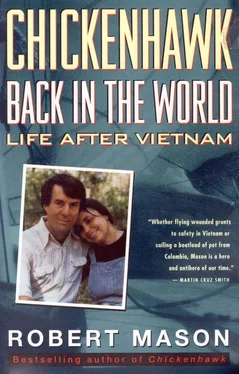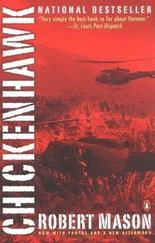Robert Mason - Chickenhawk - Back in the World - Life After Vietnam
Здесь есть возможность читать онлайн «Robert Mason - Chickenhawk - Back in the World - Life After Vietnam» весь текст электронной книги совершенно бесплатно (целиком полную версию без сокращений). В некоторых случаях можно слушать аудио, скачать через торрент в формате fb2 и присутствует краткое содержание. Год выпуска: 2013, Издательство: BookBaby, Жанр: Старинная литература, на английском языке. Описание произведения, (предисловие) а так же отзывы посетителей доступны на портале библиотеки ЛибКат.
- Название:Chickenhawk: Back in the World - Life After Vietnam
- Автор:
- Издательство:BookBaby
- Жанр:
- Год:2013
- ISBN:нет данных
- Рейтинг книги:3 / 5. Голосов: 1
-
Избранное:Добавить в избранное
- Отзывы:
-
Ваша оценка:
- 60
- 1
- 2
- 3
- 4
- 5
Chickenhawk: Back in the World - Life After Vietnam: краткое содержание, описание и аннотация
Предлагаем к чтению аннотацию, описание, краткое содержание или предисловие (зависит от того, что написал сам автор книги «Chickenhawk: Back in the World - Life After Vietnam»). Если вы не нашли необходимую информацию о книге — напишите в комментариях, мы постараемся отыскать её.
Chickenhawk: Back in the World - Life After Vietnam — читать онлайн бесплатно полную книгу (весь текст) целиком
Ниже представлен текст книги, разбитый по страницам. Система сохранения места последней прочитанной страницы, позволяет с удобством читать онлайн бесплатно книгу «Chickenhawk: Back in the World - Life After Vietnam», без необходимости каждый раз заново искать на чём Вы остановились. Поставьте закладку, и сможете в любой момент перейти на страницу, на которой закончили чтение.
Интервал:
Закладка:
An hour later, two deputies, one white and one black, let us out of the cell and escorted us to the elevator. They took us to the basement, where they fitted us with chains. They put fat leather belts on our waists which had metal rings on them through which they threaded long chains so we were chained together. If we made a break for it, we would look like three handcuffed mountain climbers in a rush.
“What’s this?” John said. “We’ve been walking around this place all day with no cuffs, no nothing. Why you chaining us now?”
“Regulations,” the black deputy said. “I got no choice.”
The white deputy opened the door and we walked out, trailing each other. They guided us to a big Ford and let us in the backseat.
It was about two in the afternoon as the Ford drove up a ramp onto an expressway. The sun was bright, the air chilled. We drove along the expressway. The sun hit my face, feeling pleasant. The people in the passing cars seemed so different now. They, any of them, could, on a whim, just turn off at the next exit, go anywhere they wanted to go. They were free.
The black deputy apparently got a lot of complaints about the chains. “I had to transport this guy once, a farmer,” the deputy said. “He was in jail for making his own liquor. Judge let him out of jail temporarily to go harvest his tobacco crop, you know?”
“They let people out of jail to do that?” Ireland said.
“Yeah, they can. This judge did. Anyway, this old boy had been home for over a month, the harvest was over, and the judge said I should go fetch him back to jail. So we, Billy, here,” he said, nodding to the white deputy next to him, “Billy and me, we go out to the sticks to this guy’s house. Damned if he wasn’t waiting for us, all cleaned up and ready to go; been out there for a month, could’ve just took off. His wife is saying good-bye; his kids are crying. Then I tell him I have to put on the cuffs. Damned if he didn’t get crazy! He says, ‘What? I been out here by myself, trustworthy as you fucking please, and you want to put me in chains?’ And I say, ‘C’mon, now. This is just regulations. If it was up to me, I wouldn’t do it, you know?’ Well, the guy just didn’t understand it, the regulations, you know. Took it personal. He proceeded to get real loud and nasty and me and Billy had to draw our guns. By then he had worked himself into such a state that made him even madder. He got started looking like he was going to hit us, and we ended up having to shoot the guy.”
“You shot him?” John said.
“Had to. He woulda taken off. Didn’t kill him or nothing. Just wounded him, you know?” The deputy nodded to himself behind the wheel. “Just the same, it was nasty business. I didn’t feel good about hurting that dumb redneck. Plus, he got more time for attempted escape. Nasty business. I’m looking forward to retiring this coming year.”
Nobody said anything for a while. I watched a family packed in a station wagon pass us. A boy in the back stared at me curiously. I looked away, at the back of the deputy’s head. “Where you going? When you retire?” I said.
“Miami. Have a kid down there. Owns a bar. Thought I’d join him in my afternoon years,” the deputy said. “Ever been to Miami?”
“Yes,” I said.
“Nice, ain’t it?”
“It’s the pits. I’d give anything to be there right now.”
The two deputies laughed while we drove onto an off ramp to a highway. We were twenty minutes from Charleston, in the country. In the distance we could see a complex of low beige buildings surrounded by chain-link fences topped with coils of barbed wire. “That’s the Charleston County Jail, boys,” the deputy said.
Twelve hours after we’d been caught in Five-Fathom Creek, we were standing in the receiving area of the Charleston County Jail. We were tired and utterly defeated. John was not cracking jokes. Ireland looked terrible, kept complaining that his stomach was getting worse. I just watched, dazed, as they unlocked the chains, pulled them through the rings on our belts. They unfastened our belts and pointed to a black guy standing in the hall. “Follow him,” the white deputy said.
We followed the black clerk into a room and gave him our watches and wallets, which he put into manila envelopes and labeled with a felt-tip pen. Then he fingerprinted us. When he finished, he told us to wait outside in the hallway.
We stood against the wall and watched the cops coming and going at the main entrance. A woman behind a tall desk talked on a radio and answered the phone. Guards walked in and nodded at us vaguely as they walked by. All this coming and going inside a county jail was kind of interesting if you’d never seen it before. It was a testimony to our fatigue that it took us fifteen minutes to realize that we could just walk out the door.
“Nobody’s watching the damn door!” John hissed.
I stared at the door and watched a guard walk out unnoticed. The woman was talking on the phone and didn’t press a buzzer to unlock the door; the door was just open. Now and then, somebody would look at us, but since we were dressed in our sailing clothes, we just looked like run-of-the-mill American deadbeats, possibly homeless, certainly not prisoners. We were invisible as far as people trained to watch people dressed as prisoners were concerned.
“We could just walk out of here,” I said.
John laughed. “I know! It’s unbelievable!”
Ireland looked at us, grimacing. He said his stomach was twisting up in knots. His suntanned skin had paled and he winced when he said, “They want us to walk out; then they shoot us.”
“Naw,” John said. “They’re not that smart. These people are just working. They don’t give a shit about us.” He walked toward the door.
I followed, wondering just how far we could get, but John veered from the door and walked up to the woman behind the tall desk. We stood about ten feet from the glass doors to freedom, staring at the woman. She looked up, smiled, and said “May I help you?” with a look of faint surprise on her face from, I believe, our general haggard appearance.
“Maybe,” John said. He looked at me and back at the woman. “We’re prisoners. Checking in.”
The woman grinned, leaned back ready for a big laugh, then snapped forward, assuming the posture of open-mouthed incredulity. “Excuse me?” she said.
“We’re prisoners,” John said. “Guy told us to wait here, but it’s been a half hour.”
The woman was nodding as John spoke, but she was distracted, looking everywhere for a guard. One came up behind us and got in line, waiting his turn.
“Johnson,” the woman blurted to the guard. “These men are prisoners.”
Johnson jerked out of a daydream stupor, which people who work in places like this develop as a survival skill, and stared at us like we’d just stepped off a spaceship.
“Prisoners?”
“Yessir,” I said. “Guy told us to wait—”
“What guy?”
I pointed to the room where we had checked our stuff.
“Goddammit,” Johnson said. He leaned close to the woman and said, “Call Willy and tell him to get his ass back to work!”
The woman nodded quickly and punched a phone button. Meanwhile, Johnson escorted us down the hall that led into the depths of the Charleston County Jail.
Everything was made of poured concrete in this jail. The floors, the walls—no bricks. They’d painted the floors gray and the walls pale green in keeping with the building’s spirit of dull utility.
Johnson stopped at a door marked clothing room and opened it. Inside the small room, floor-to-ceiling shelves were filled with what can only be described as rags—blue and gray tattered pants and shirts. Johnson handed us each a net laundry bag. “Take off your civvies and put everything in the bag,” he said.
Читать дальшеИнтервал:
Закладка:
Похожие книги на «Chickenhawk: Back in the World - Life After Vietnam»
Представляем Вашему вниманию похожие книги на «Chickenhawk: Back in the World - Life After Vietnam» списком для выбора. Мы отобрали схожую по названию и смыслу литературу в надежде предоставить читателям больше вариантов отыскать новые, интересные, ещё непрочитанные произведения.
Обсуждение, отзывы о книге «Chickenhawk: Back in the World - Life After Vietnam» и просто собственные мнения читателей. Оставьте ваши комментарии, напишите, что Вы думаете о произведении, его смысле или главных героях. Укажите что конкретно понравилось, а что нет, и почему Вы так считаете.












